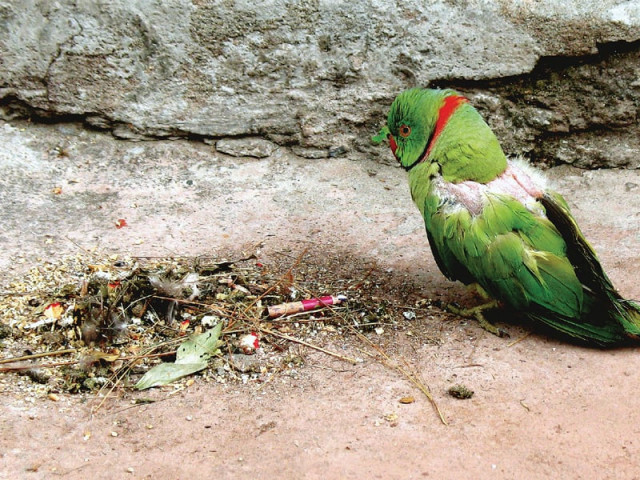Up north and personal: Out of sight
Zahrah’s budgie goes from loving mother to serial killer.

Up north and personal: Out of sight
This was one such morning. Thunder vibrating through mountains, valleys and forests added a Dickensian touch of theatrical finesse. All that was needed was a shrill scream and a murder…both of which took place!
The scream was mine when I almost trod on the black scorpion that had crawled in under the back door, seeking shelter from the approaching storm. The murder had been committed by Mrs Joe, who has undergone a revolting transformation from loving mother to serial killer. This feathered fiend is perpetually sitting on eggs, each perfect oval invisibly labeled ‘Breakfast’, ‘Lunch’ and ‘Dinner’. Chicks periodically hatch out. Tiny, defenceless Sméagols that Mrs Joe devours when my back is turned. She is a cannibal. Joe and her firstborn, Biggles, are, as far as I can tell, nonplussed. Joe whistles his usual morning greeting the second he hears me up and about; Biggles flies from perch to swing to food bowl in anticipation of breakfast. Mrs Joe, stomach full of pecked-to-pieces offspring, sits innocently on unhatched eggs, waiting for her next victim to emerge.
I think — not being a budgie psychologist, only ‘think’, mind you — that Mrs Joe is jealous of Biggles. Before he arrived on the scene, Joe and Mrs Joe were the perfect loving pair. Then, however, Biggles hatched out, was fed by both parents, grew at an astonishing rate and eventually emerged from the nesting pot so full of vim and vigour that he set their previously placid world on its head. His days are full of trickery and flying escapades, every single movement accompanied by a running commentary of whistles, squeaks and squawks. He scolds, curses and, more to the point, selfishly demands all of Joe’s attention. Mrs Joe is, therefore, neglected. She sits in the nesting pot planning revenge — the revenge being to eat every new hatchling before it has the slightest chance of achieving competitor status. All is not well in the budgie cage. The cure, possibly, is to remove Biggles from the family home, but this presents its own set of problems. If I put him in a cage on his own he will be miserable as sin. I should first get him a companion but this means having two large cages on the window sill and there isn’t room. Well, there is if I refrain from opening windows and can adjust to lack of light in the living room but come winter, one of the cages will be too far from the fire and its inhabitants might freeze. Biggles, it seems, will have to go and I hate the thought of parting with him as he is the life and soul of the party. Maybe I should get rid of Mrs Joe and simplify matters by keeping the two males but, unlike some humans I can think of, budgies pair for life so that would be cruel. Circles and roundabouts.
I was ruminating over the matter as I climbed up the mountain, on my way to the nearest store, when a voice emerged from the undergrowth at the side of the path: “Aunty, Aunty. My uncle gave me a parrot two weeks ago and its feathers have fallen out. Please come and tell me what to do.”
It was one of my former students! ‘Former’ as the trio rarely arrived for their English lesson on time, if they arrived at all. When they did, they wanted to gossip not learn and, in what was the last straw, passed on a virulent form of viral pneumonia which laid me low for weeks last summer. I scrambled up the muddy incline to her home, a neat and tidy stone affair with painted shutters over glassless windows and a total absence of indoor water. Swathed in brilliant orange and white from the top of her head to her orange-painted toenails, she was vigorously scrubbing pots and pans with, of all things, a worn out toothbrush, under the outside tap. This is her assigned chore, come rain or snow, yet it wouldn’t take much to extend the pipe right into the kitchen and put in a rudimentary drain.
“The parrot is round the back Aunty. Please go and have a look at it while I finish off here.”
The parrot, actually a rose-ringed parakeet, sat forlornly by a small heap of sweepings containing a minute amount of bajera and an awful lot of dirt. Unable to fly and unsteady on its feet, its upper back and part of its stomach stark naked, the bird presented a sad spectacle. Its cage, glimpsed through the open door of the store room it had been relegated to, contained neither food nor water. The bird was, I suspected, suffering from both hunger and thirst and wouldn’t be alive much longer unless something was done and done promptly.
“What’s wrong with it, Aunty?” the girl asked as she came round the corner rearranging her head covering.
“What are you feeding it?” I enquired.
“Oh it eats everything,” she assured me. “It eats the grass, bits of wood and even tries to eat stones. I gave it some bajera the other day too.”
“It’s hungry,” I told her. “You need to feed it bajera, fruit and vegetables every day and it needs water to be available all the time. It should have things like sunflower seeds as well and I’m sure it would enjoy a tomato.”
“Yes, Aunty,” she nodded. “I’ll get some.”
I knew she wouldn’t. Feeding pets isn’t something these people are prepared to do and this isn’t because they cannot afford to, they just won’t. Food is for people not for animals and birds. We stood watching the malnourished parrot for a moment or two and then she suddenly insisted, most vehemently, that we return to the other side of the house, and I immediately knew why.
The people in this area are extremely house proud: floors are swept, furniture polished, mats taken out and shaken, bedding aired almost every day. But cleanliness stops at the doorstep — as long as garbage is outside and, preferably, out of sight, then so be it. Household refuse, largely consisting of ubiquitous plastic bags, empty plastic bottles and the like, is simply tossed in the surrounding forest or, as in this case, an odiferous heap in a corner behind the house which visitors are not supposed to see. Houses, like people, are designed to be viewed from the front not the rear.
Published in The Express Tribune, Sunday Magazine, July 17th, 2011.



















COMMENTS
Comments are moderated and generally will be posted if they are on-topic and not abusive.
For more information, please see our Comments FAQ